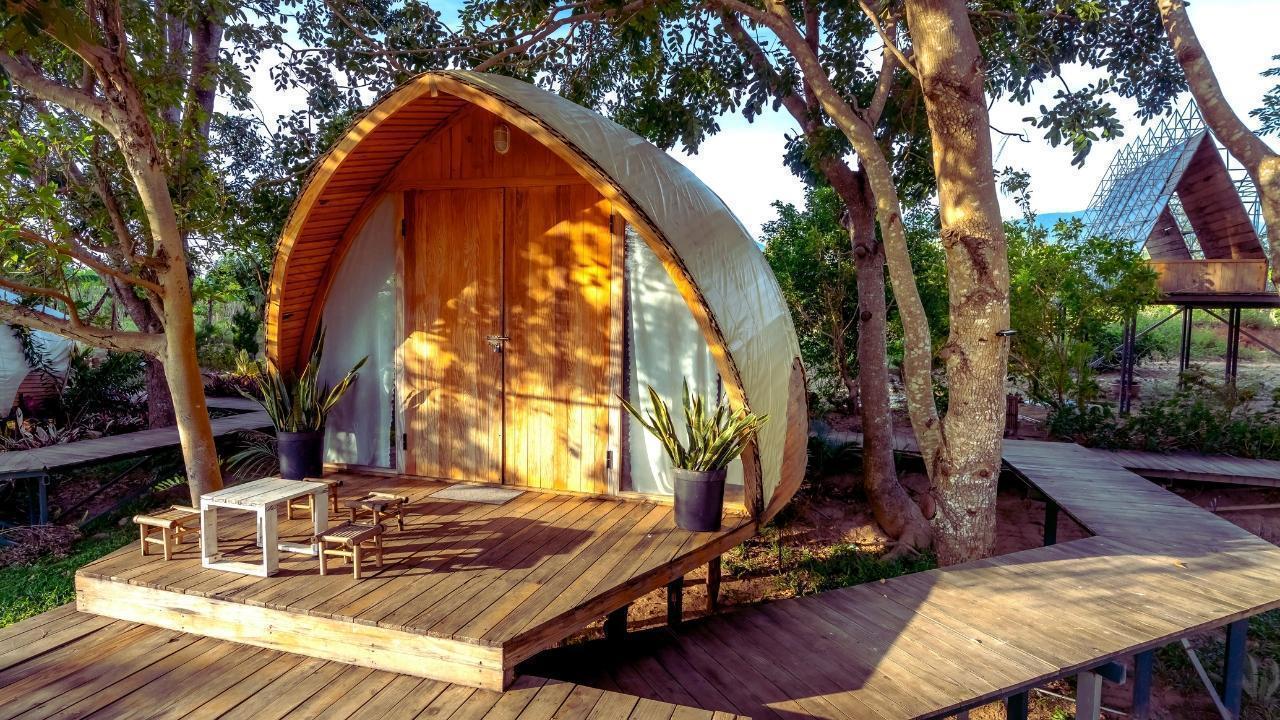You have not yet added any article to your bookmarks!

Join 10k+ people to get notified about new posts, news and tips.
Do not worry we don't spam!

Post by : Anis Farhan
Tourism is no longer just about ticking destinations off a bucket list. In 2025, conscious travelers are redefining what it means to experience the world. From carbon-offsetting flights to plant-based resorts, green travel is going mainstream — especially in Asia, where a new wave of eco-conscious itineraries is merging environmental awareness with cultural authenticity.
The pandemic triggered a massive shift in values, and for many travelers, sustainability is now a key filter for planning trips. Mass tourism is being replaced by minimal-impact journeys, while eco-stays — accommodations designed around sustainability — are becoming the new luxury. In place of over-touristed hotspots, travelers are seeking quiet sanctuaries where nature, community, and carbon neutrality take center stage.
This isn't a fleeting travel trend. It's the beginning of a more intentional movement — and Asia is rising as a global leader in responsible tourism.
The term “eco-stay” often evokes images of tents in forests or bamboo huts by the beach, but the modern eco-lodge is far more sophisticated. True eco-stays today are carbon-conscious accommodations that focus on sustainable design, local sourcing, waste reduction, water conservation, and community impact.
Examples include:
Solar-powered energy systems
Zero single-use plastic policies
Rainwater harvesting and greywater recycling
Farm-to-table organic dining
Architecture that blends into natural landscapes
Local staff employment and fair wage practices
In Bhutan, the Amankora lodges use traditional materials and work with local craftsmen, while remaining carbon-neutral. In Indonesia, Bambu Indah is built with reclaimed wood and supports permaculture farming. These places offer luxury without guilt — where every aspect of your stay leaves a lighter footprint.
There’s a growing awareness among travelers about tourism's environmental costs. The global tourism sector accounts for roughly 8% of global carbon emissions, including transport, hotels, and food. Over-tourism has also damaged fragile ecosystems, from coral reefs in the Philippines to rice terraces in Bali.
A new generation of travelers — especially Millennials and Gen Z — are voting with their wallets. According to a 2024 Booking.com survey, 71% of global travelers said they prefer eco-friendly accommodations, and nearly half are willing to pay more for them.
In Asia, this sentiment is even stronger. Cities like Singapore, Kyoto, and Chiang Mai have seen increased bookings for boutique green properties. Eco-stays are not just about sustainability — they offer authentic experiences, cultural immersion, and a sense of ethical pride.
An eco-stay is just the starting point. Today’s responsible traveler wants the entire journey to reflect sustainable values. Enter the “green itinerary” — a thoughtfully curated travel plan that prioritizes low-impact experiences, local economies, slow travel, and nature conservation.
Elements of a green itinerary might include:
Using trains or electric transport over flights
Visiting locally-owned homestays and small-scale farms
Participating in beach cleanups or community reforestation
Learning crafts from artisans rather than buying mass-produced souvenirs
Choosing off-season travel to avoid overcrowding
In Vietnam, travelers are opting for rail journeys through the countryside instead of short-haul flights. In Sri Lanka, responsible travel companies offer "voluntourism" packages where visitors help with elephant rehabilitation or coral planting.
Green itineraries aim to minimize harm and maximize positive impact — on both the environment and the communities that host travelers.
Eco-tourism is not just about protecting forests and oceans — it’s about uplifting local people. The most successful eco-stays and green itineraries are built in partnership with local communities, where tourism dollars support schools, healthcare, and livelihoods.
In Nepal, community-run homestay programs allow visitors to live in traditional houses, eat home-cooked food, and join village festivals. In Malaysia, the Miso Walai Homestay in Sabah trains indigenous villagers to manage tourism sustainably, while preserving their language and customs.
By staying local, travelers ensure that their money doesn’t vanish into multinational chains — it circulates within the local economy, creating real social impact.
Far from being rustic or outdated, green travel is getting smarter. Technology is now at the forefront of enabling responsible travel decisions.
Apps like HappyCow help vegans and vegetarians find sustainable restaurants around Asia. Platforms such as EcoHotels.com and BookDifferent allow users to book only certified green properties. Travel companies use AI-driven carbon calculators to let travelers estimate — and offset — their carbon footprint.
Even blockchain is entering the space. Certain platforms now offer transparent impact tracking, showing travelers exactly how their booking contributes to forest restoration or plastic removal.
Tech doesn’t replace sustainability — it amplifies it, making it easier for travelers to align values with action.
Eco-stays and green itineraries are influencing how larger industry players behave. Tour operators, airlines, and tourism boards are being pushed to adopt sustainable practices or risk losing relevance.
AirAsia now allows travelers to opt into carbon offset programs during bookings. Japan Airlines and Singapore Airlines are investing in sustainable aviation fuel (SAF) development. Meanwhile, tour operators such as Intrepid Travel and G Adventures are offering 100% carbon-neutral tours with local impact programs baked into their packages.
National tourism boards are also responding. South Korea launched a Green Tourism campaign in 2024. Thailand is developing “low-carbon zones” with incentives for hotels to adopt eco-certifications. These changes show that green travel is shifting from the margins to the mainstream.
One of the strongest forces driving green travel is the global wellness movement. Travelers are increasingly linking personal health with planetary health. As a result, wellness resorts are doubling down on eco-credentials — from organic spa ingredients to chemical-free pools and mindful design.
In Bali, yoga retreats like Fivelements promote not just detox and healing, but also environmental harmony through plant-based cuisine and bamboo architecture. In Japan, onsen towns are rebranding around sustainability, promoting local crafts, seasonal foods, and slow living.
Green travel now caters to mindful escapism, where the journey heals both the traveler and the planet.
As sustainability becomes fashionable, many properties and tour operators are guilty of greenwashing — using eco-labels without real impact. “Eco” has become a marketing buzzword, sometimes with little substance behind it.
Discerning travelers are now demanding proof of impact. They look for certifications like EarthCheck, LEED, or Green Globe, as well as third-party audits and transparent operations. Social media and review platforms have empowered consumers to call out false claims and celebrate genuine efforts.
The future of responsible travel depends on authenticity and accountability — and the industry must rise to meet these expectations.
COVID-19 gave the world a rare chance to rethink travel. As skies cleared and nature returned to tourist-free spaces, many asked: Can we do this better? The answer lies in the rise of responsible travel — an ethos that respects both place and people.
Eco-stays and green itineraries offer a sustainable blueprint for post-pandemic tourism, one that balances wanderlust with wisdom. They invite travelers not just to see the world, but to be part of its healing.
As Asia continues to lead in both travel innovation and cultural richness, it has a unique opportunity to shape the future of global tourism — one that’s greener, fairer, and more fulfilling.
This article is intended solely for editorial and informational purposes. The eco-stays, programs, platforms, and destinations mentioned are used as illustrative examples and do not imply endorsements by Newsible Asia. Readers are advised to independently verify environmental claims, certifications, and service quality before booking or participating in any green travel experiences.










Sumo Rocked by New Bullying Scandal as Terunofuji Admits Abuse
Retired grand champion turned stablemaster reports himself to authorities for violent conduct toward

Son of Oil Tycoon Riza Chalid Sentenced to 15 Years in $17 Billion Corruption Scandal
Jakarta Corruption Court convicts Muhammad Kerry Adrianto Riza in high‑profile Pertamina graft case

Marina Bay to Celebrate Disney Adventure With Fireworks & Fun
UOB Marina Bay Sands & Singapore Tourism Board join Disney Cruise Line for a 2-month nautical celebr

Rashmika Mandanna and Vijay Deverakonda Tie the Knot in Grand Udaipur Wedding
The beloved actors celebrated their Telugu and Kodava heritage with traditional ceremonies at ITC Me

Raja Ampat Welcomes Back Endangered Zebra Sharks
Scientific collaboration and community education drive rare species repopulation in the Coral Triang

Tomorrowland Thailand Set for Full‑Scale Asian Debut in December 2026
Thailand to host world‑renowned electronic music festival in Pattaya, expected to draw tens of thous